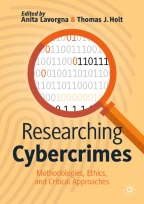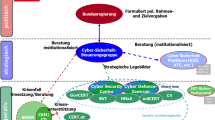The How and Why of Cybercrime: The EU as a Case Study of the Role of Ideas, Interests, and Institutions as Drivers of a Security-Governance Approach

Conducting research on the politics of cybercrime requires an understanding of the role of the actors involved in its definition, application, and enforcement. In particular, what drives policymakers to decide that an issue in cyberspace is a “crime” issue, and what type of response is most suited to that issue? Using the case study of the EU’s actions in the field of cybercrime as part of a broader “policy universe” within the context of the Area of Freedom, Security, and Justice, this chapter demonstrates that the framing of cybercrime as a specific form of insecurity is deeply political, and the result of a range of ideas, interests, and institutions that serve as drivers for an approach that is often unrelated to cybercrime itself. With the blurring of state and non-state actors involved in both perpetrating and combating cybercrime, and new phenomena such as online disinformation and data manipulation becoming pervasive, current EU approaches seem ill-equipped to tackling new forms of cyber-insecurity.
This is a preview of subscription content, log in via an institution to check access.
Access this chapter
Subscribe and save
Springer+ Basic
€32.70 /Month
- Get 10 units per month
- Download Article/Chapter or eBook
- 1 Unit = 1 Article or 1 Chapter
- Cancel anytime
Buy Now
Price includes VAT (France)
eBook EUR 46.00 Price includes VAT (France)
Softcover Book EUR 58.01 Price includes VAT (France)
Tax calculation will be finalised at checkout
Purchases are for personal use only
Similar content being viewed by others

Governing through cybersecurity: national policy strategies, globalized (in‑)security and sociotechnical visions of the digital society
Article Open access 27 May 2019

The New Frontier for Human Cybersecurity: Russia’s Cybersecurity Policies in the Arctic
Chapter © 2020

Unpacking the political-criminal nexus in state-cybercrimes: a macro-level typology
Article Open access 07 February 2023
References
- Bachmann, S. D., & Gunneriusson, H. (2015). Russia’s hybrid warfare in the East: The integral nature of the information sphere military matters. Georgetown Journal of International Affairs,16, 198–211. Google Scholar
- Ballou, T., Allen, J., & Francis, K. (2016). Hands-off approach or effective partnership? Journal of Information Warfare,15, 44–59. Google Scholar
- Barrinha, A. (2020). European security in cyberspace. In A. Calcara, R. Csernatoni, & C. Lavallée (Eds.), Emerging security technologies and EU governance: Actors, practices and processes. Routledge. Google Scholar
- Bechtold, E. (2020). Terrorism, the internet, and the threat to freedom of expression: The regulation of digital intermediaries in Europe and the United States. Journal of Media Law,12, 13–46. ArticleGoogle Scholar
- Bossetta, M. (2018). The weaponization of social media: Spear phishing and cyberattack on democracy. Journal of International Affairs,71, 97–106. Google Scholar
- Buchanan, T., & Benson, V. (2019). Spreading disinformation on Facebook: Do trust in message source, risk propensity, or personality affect the organic reach of “fake news”? Social Media + Society, 5, 1–9. Google Scholar
- Cantero Gamito, M. (2018). Europeanization through standardization: ICT and telecommunications. Yearbook of European Law,37, 395–423. ArticleGoogle Scholar
- Carrapico, H., & Barrinha, A. (2018). European Union cyber security as an emerging research and policy field. European Politics and Society,19, 299–303. ArticleGoogle Scholar
- Carrapico, H., & Farrand, B. (2018). Cyber crime as a fragmented policy field in the context of the area of freedom, security and justice. In A. Ripoll Servent & F. Trauner (Eds.), The Routledge handbook of justice and home affairs research, Routledge Handbook Series. Routledge. Google Scholar
- Carrapico, H., & Farrand, B. (2017). Dialogue, partnership and empowerment for network and information security: The changing role of the private sector from objects of regulation to regulation shapers. Crime, Law and Social Change,67, 245–263. ArticleGoogle Scholar
- Carrapico, H., & Farrand, B. (2016). The European Union’s fight against cybercrime: Policy, legal and practical challenges. In M. Fletcher, E. Herlin-Karnell & C. Matera (Eds.), The European Union as an area of freedom, security and justice. Routledge. Google Scholar
- Christensen, K. K., & Petersen, K. L. (2017). Public–private partnerships on cyber security: A practice of loyalty. International Affairs,93, 1435–1452. ArticleGoogle Scholar
- Christou, G. (2015). Cybersecurity in the European Union: Resilience and adaptability in governance policy. AIAA. Houndmills. Google Scholar
- Clough, J. (2015). Principles of cybercrime. Cambridge University Press. Google Scholar
- Computer Crime and Intellectual Property Section Criminal Division. (2007). Prosecuting computer crimes. Office of Legal Education Executive Office for United States Attorneys. Google Scholar
- Council of the European Union. (2000). eEurope 2002—An information society for all. Brussels. Google Scholar
- Council of the European Union. (1997). Action plan to combat organised crime (No. C251/1–15.8.97). Official Journal of the European Communities. Google Scholar
- de Arimatéia da Cruz, J. (2020). The legislative framework of the European Union (EU) convention on cybercrime. In T. J. Holt & A. M. Bossler (Eds.), The Palgrave handbook of international cybercrime and cyberdeviance. Springer. Google Scholar
- Deflem, M., & Shutt, E. (2006). Law enforcement and computer security threats and measures. In H. Bidgodi (Ed.), Handbook of information security, information warfare, social, legal, and international issues, and security foundations. Wiley. Google Scholar
- Dunn Cavelty, M. (2013). A resilient Europe for an open, safe and secure cyberspace (No. 23). Swedish Institute of International Affairs. Google Scholar
- European Commission. (1985). White paper: Completing the internal market (No. COM(85) 310 final). European Commission, Brussels. Google Scholar
- European Commission. (1993). Growth, competitiveness, employment: The challenges and ways forward into the 21st century—White paper (No. COM(93)700 final). Google Scholar
- European Commission. (2000). Creating a safer information society by improving the security of information infrastructures and combating computer-related crime (No. COM(2000) 890). Google Scholar
- European Commission. (2007). Towards a general policy on the fight against cyber crime (No. COM(2007) 267). Google Scholar
- European Commission. (2010). The EU internal security strategy in action: Five steps towards a more secure Europe (No. COM(2010) 673 final). Google Scholar
- European Commission. (2012). Tackling crime in our digital age: Establishing a European cybercrime centre (No. COM(2012) 140). Google Scholar
- European Commission. (2015). The European agenda on security (No. COM(2015) 185). Google Scholar
- European Commission. (2018a). Tackling online disinformation: A European approach (No. COM(2018) 236). Google Scholar
- European Commission. (2018b). EU code of practice on online disinformation. Google Scholar
- European Commission. (2018c). Proposal for a regulation on preventing the dissemination of terrorist content online (No. COM(2018) 640). Google Scholar
- European Commission. (2019a). Twentieth progress report towards an effective and genuine Security Union (No. COM(2019) 552). Google Scholar
- European Commission. (2019b). Code of practice on disinformation: First annual reports. Google Scholar
- European Commission. (2020a). Communication on the EU security union strategy (No. COM(2020) 605. Google Scholar
- European Commission. (2020b). Cybercrime: New survey shows Europeans feel better informed but remain concerned. Accessible at: https://ec.europa.eu/commission/commissioners/2019-2024/schinas/announcements/cybercrime-new-survey-shows-europeans-feel-better-informed-remain-concerned_en.
- European Commission. (2020c). Special Eurobarometer 499—European’s attitudes towards cyber security. Google Scholar
- European Commission. (2020d). Europe’s moment: Repair and prepare for the next generation (No. COM(2020) 456 final). Google Scholar
- European Commission, Bangemann Group. (1994). Europe and the global information society: Recommendations of the high-level group on the information society to the Corfu European Council (No. S.2/94). Brussels. Google Scholar
- European Commission and High Representative of the European Union for Foreign Affairs and Security Policy. (2013). Cybersecurity strategy of the European Union: An open, safe and secure cyberspace (No. JOIN(2013) 1). Brussels. Google Scholar
- European Commission and High Representative of the Union for Foreign Affairs and Security Policy. (2016). Joint framework on countering hybrid threats (No. JOIN(2016) 18). Google Scholar
- European Council. (1999). Tampere European Council conclusions. Tampere. Google Scholar
- European Parliament and Council of the European Union. (1999). Decision No. 276/1999/EC of the European Parliament and of the Council of 25 January 1999 adopting a multiannual Community action plan on promoting safer use of the Internet by combating illegal and harmful content on global networks. Google Scholar
- Europol. (2020). Catching the virus: Cybercrime, disinformation and the COVID-19 pandemic. Accessible at: https://www.europol.europa.eu/publications-documents/catching-virus-cybercrime-disinformation-and-covid-19-pandemic.
- Fahey, E. (2014). The EU’s cybercrime and cyber-security rulemaking: Mapping the internal and external dimensions of EU security. European Journal of Risk Regulation,5, 46. ArticleGoogle Scholar
- Gercke, M. (2009). Europe’s legal approaches to cybercrime. ERA Forum,10, 409–420. ArticleGoogle Scholar
- Kierkegaard, S. M. (2007). EU tackles cyber crime. In L. J. Janczewski & A. M. Colarik (Eds.), Cyber warfare and cyber terrorism. IGI Global. Google Scholar
- Kingdon, J. W. (1984). Agendas, alternatives, and public policies. Harper Collins. Google Scholar
- Klompmaker, N. (2019). Censor them at any cost: A social and legal assessment of enhanced action against terrorist content online scientific. Amsterdam L.F. 11, 3–29. Google Scholar
- Levi-Faur, D. (2012). Regulatory networks and regulatory agencification: Towards a single European regulatory space. In B. Rittberger & A. Wonka (Eds.), Agency governance in the EU. Routledge. Google Scholar
- Marsden, C., Meyer, T., & Brown, I. (2020). Platform values and democratic elections: How can the law regulate digital disinformation? Computer Law & Security Review,36, 105373. ArticleGoogle Scholar
- Pielemeier, J. (2020). Disentangling disinformation: What makes regulating disinformation so difficult? Symposium: News, disinformation, and social media responsibility. Utah Law Review,2020, 917–940. Google Scholar
- Schjolberg, S. (2008). The history of global harmonization on cybercrime legislation—The road to Geneva. Cyber Crime Law. Accessible at: https://cybercrimelaw.net/documents/cybercrime_history.pdf.
- Sabbagh, D. (2020). Covid-related cybercrime drives attacks on UK to record number. The Guardian. Accessible at: https://www.theguardian.com/technology/2020/nov/03/covid-related-cybercrime-drives-attacks-on-uk-to-record-number.
- Sieber, U. (1998). Legal aspects of computer-related crime in the information society: Prepared for the European Commission. University of Würzburg. Accessible at: https://www.law.tuwien.ac.at/sieber.pdf.
- Treverton, G. F., Thvedt, A., Chen, A. R., Lee, K., & McCue, M. (2018). Addressing hybrid threats. Center for Asymmetric Threat Studies; The European Centre of Excellence for Countering Hybrid Threats, Swedish Defence University. Google Scholar
- Wall, D.S. (2007). Cybercrime: The transformation of crime in the information age. Polity Press. Google Scholar
- Wall, D. S., & Williams, M. L. (2013). Policing cybercrime: Networked and social media technologies and the challenges for policing. Policing and Society,23, 409–412. ArticleGoogle Scholar
- Wendt, A. (1999). Social theory of international politics. Cambridge University Press. Google Scholar
Author information
Authors and Affiliations
- Newcastle University, Newcastle upon Tyne, UK Benjamin Farrand
- Northumbria University, Newcastle upon Tyne, UK Helena Carrapico
- Benjamin Farrand



